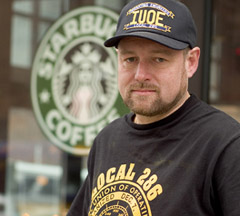Slow Roasted - Seven years of anti-labor practices backfire on coffee giant
Submitted on Thu, 03/23/2006 - 6:32pm
By CYDNEY GILLIS - Staff Reporter; reposted from RealChangeNews.Org, March 9, 2006.
 Starbucks settled 15 charges of unfair labor practices in New York Tuesday — a move the Industrial Workers of the World are hailing as a victory in their drive to unionize the coffee’s giants baristas.
Starbucks settled 15 charges of unfair labor practices in New York Tuesday — a move the Industrial Workers of the World are hailing as a victory in their drive to unionize the coffee’s giants baristas.
The Wobblies say Starbucks agreed to reinstate two union members who had lost their jobs — Sarah Bender and Anthony Polanco — and stop interfering with union organizing activities.
The settlement is so complete, says one IWW member, it’s a virtual “neutrality agreement” that sets the stage for the union to expand its efforts.
For Mark Tutalo, a former Starbucks employee who sued the company last month, the settlement comes about seven years too late.
In his lawsuit, filed Feb. 6 in King County Superior Court, Tutalo claims the company made him pay for his union affiliation by repeatedly refusing to change his shift from nights to days — a request Tutalo says he made under the Americans with Disabilities Act.
Tutalo, of Covington, is a Gulf War veteran with a documented case of post-traumatic stress disorder that he says makes it difficult for him to sleep during the day.
In 1999, years before the renegade Wobblies started their union drive in New York, 19 of the 21 people who once worked at Starbucks’ roasting plant in Kent voted to join the International Union of Operating Engineers and, after two years of struggle with the company, finally got a contract.
IUOE’s business manager, Dave Maxwell, says he believes it was Starbucks’ first U.S. union — and Tutalo and former c-worker, Jeff Alexander, were supporters.
They say Starbucks pulled out all the stops to kill the union. Starbucks Chairman Howard Schultz came down in person to talk workers out of unionizing. After the vote, they say Starbucks brought in an union-busting law firm and managers intimidated union members, writing them up for minor safety infractions until, one by one, union members left the plant.
“ Over time, it was a grind working there,” says Alexander, who now works directly for Local 286 of the Operating Engineers. “People were watching you, following you and trying to write you up on everything.”
A settlementthat Starbucks signed one year ago with the National Labor Relations Board also indicates that the company engaged in unfair hiring practices. In an apparent effort to get rid of the union —which succeeded when employees later voted for decertification — hiring managers began asking applicants in interviews about previous union membership or sympathy.
The settlement provided $125,000 to a human resources staff member who union members say was fired after she questioned the legality of union screening questions.
Another eight people who had been interviewed but not hired received $5,000 each and the option to work at the plant when an opening became available.
But, for Mark Tutalo, who left the plant in November, an opening on the day shift never came. In his lawsuit, and an NLRB charge he also filed in February, Tutalo claims he was discriminated against for giving the NLRB a statement during its 2004 investigation of unfair hiring practices at the plant.
Since 2002, the lawsuit states, Tutalo made three requests for a shift change from nights to days, two times when day positions were coming open. The requests were turned down all three times.
On Nov. 8, five hours after Tutalo submitted his two weeks’ notice, the lawsuit states Starbucks posted two vacant positions for Tutalo’s job on the day shift.
A Starbucks spokesperson did not return calls seeking comment on Tutalo’s claims or its current policies. The company has said in the past that “Starbucks does not take action or retaliate against partners who might be interested or take part in union activity.”
In spite of the IWW settlement in New York, members of the Operating Engineers say they don’t believe that’s true of what they call the Wal-Mart of coffee shops.
Despite the company’s progressive image, Tutalo says, “Howard Schultz would do anything to get rid of the union.”